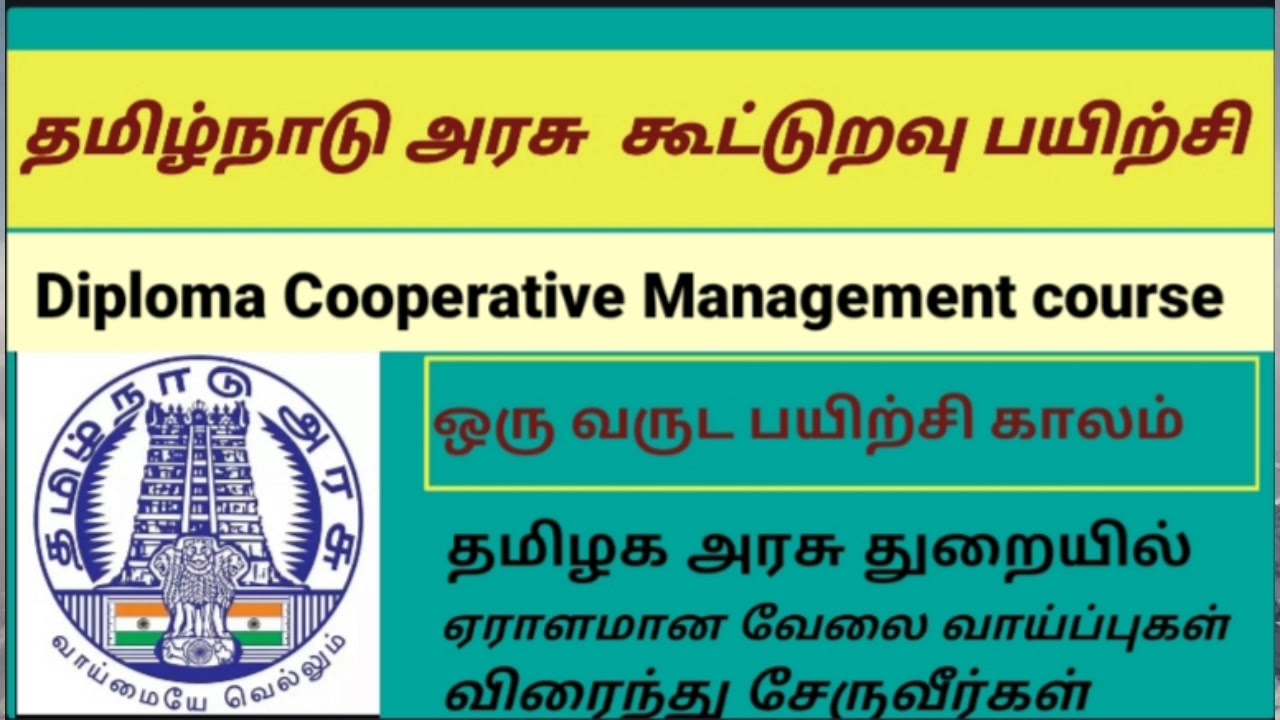“Training Opportunities with Tamil Nadu” The Tamil Nadu Cooperative Union (TNCU), established in 1914, is a cornerstone of cooperative education and training in India. With a mission to empower individuals through skill development and cooperative management, TNCU offers a wide range of training programs designed to foster employment opportunities and professional growth. Whether you’re an aspiring professional, a cooperative employee, or someone seeking self-employment, TNCU’s training initiatives can help you achieve your goals. In this article, we’ll explore the diverse training opportunities provided by TNCU and how they can benefit you.
Why Choose Tamil Nadu Cooperative Union for Training?
TNCU is a trusted institution with over a century of experience in promoting cooperative education. Its programs are tailored to meet the needs of various stakeholders, from cooperative employees to unemployed youth seeking job-oriented skills. Here’s why TNCU stands out:
- Comprehensive Training Programs: TNCU offers diploma courses, short-term certifications, and job-oriented training to cater to diverse career aspirations.
- Affordable Education: Many programs, including those at Cooperative Industrial Training Institutes (ITIs), offer fee waivers or government subsidies, making education accessible.
- Industry-Relevant Skills: Courses focus on practical skills like cooperative management, computer applications, and jewel appraisal, ensuring employability in cooperative institutions and beyond.
- Extensive Network: With 26 Institutes of Cooperative Management (ICMs) across Tamil Nadu, TNCU provides widespread access to quality education.
Key Training Programs Offered by TNCU
TNCU’s training programs are designed to enhance employability and promote self-reliance. Below are some of the flagship courses available:
1. Diploma in Cooperative Management (DCOP)
The Diploma in Cooperative Management (DCOP) is a 36-week, 400-hour program aimed at individuals seeking employment in cooperative institutions, from primary to apex levels. This course is ideal for those who have completed their 12th-grade education or equivalent.
- Eligibility: 12th pass or equivalent.
- Duration: 36 weeks.
- Mode: Available in both regular and correspondence formats for working professionals.
- Benefits: Equips learners with skills to manage cooperative societies, enhancing career prospects in banking, agriculture, and consumer cooperatives.
In 2022-23, TNCU invited applications for DCOP, with forms available on their official website, www.tncu.tn.gov.in, from July 18 to August 18.
2. Short-Duration Courses
TNCU’s short-term courses are perfect for cooperative employees and staff looking to upskill quickly. In 2010-11, 322 short-duration programs trained 5,438 individuals. Popular courses include:
- Jewel Appraisal and Techniques: Introduced in 2004-05, this course trained 1,858 individuals in 2010-11, preparing them for roles in cooperative banks issuing jewel loans.
- Computer Applications: Courses like DCA, MS Office, Tally 9.0, and DTP equip learners with digital skills, with fees starting at ₹3,000.
- Spoken English: In collaboration with VETA, TNCU offers spoken English courses to improve communication skills for cooperative employees and the general public.
3. Job-Oriented Technical Courses
To promote self-employment among youth, TNCU has introduced technical training programs in partnership with organizations like TREC-STEP. These include:
- Diploma in Computer Hardware Technology: A 3-month course costing ₹6,000.
- Diploma in Air Conditioner and Refrigeration: A 3-month course priced at ₹5,000.
- Certificate Course in Mobile Phone Services: A 6-week program for ₹5,500.
These courses are offered across TNCU’s cooperative educational institutes, providing hands-on training for entrepreneurial ventures.
4. Cooperative Industrial Training Institutes (ITIs)
TNCU operates two Cooperative ITIs at Bargur (Krishnagiri) and Pattukkottai (Thanjavur), established in 1992. These institutes offer technical training to unemployed youth, with fees waived for eligible students (₹19,05,000 allocated in 2022).
- Focus: Skill development for self-employment.
- Facilities: Both ITIs operate in their own buildings, ensuring quality infrastructure.
- Impact: Graduates are equipped to start small businesses or secure jobs in technical fields.
5. Polytechnic College at Lalgudi
Since 2000, TNCU has run a polytechnic college in Lalgudi, Trichy, approved by AICTE, New Delhi. This institution offers diploma courses in engineering and technology, providing a pathway to technical careers.
Institutes of Cooperative Management (ICMs)
TNCU manages 26 ICMs across Tamil Nadu, with 13 in owned buildings and 13 in rented facilities. Additionally, ICMs in Puducherry and Chennai (ACSTI-Madhavaram) operate in association with TNCU. These institutes are the backbone of TNCU’s training ecosystem, offering:
- Diploma in Cooperative Management: Mandatory for employment in cooperative institutions.
- Higher Diploma in Cooperative Management (HDCM): Offered at select ICMs, such as Natesan Institute in Chennai, for advanced roles.
- Specialized Courses: Including craftsman training and food production, introduced in 2008-09 with fees of ₹15,000.
The first ICM was established in Thanjavur in 1927, marking a long legacy of cooperative education.
Upcoming Initiatives
TNCU is expanding its training infrastructure with ambitious projects:
- National Level Institute of Research and Training at Kodaikanal: With a ₹126 crore budget, construction is set to begin following approval from the Dindigul District Collector in 2022. TNCU’s contribution is ₹26.46 crore.
- Athoor Cooperative Arts & Science College: Established in 2021, this college offers undergraduate programs to promote cooperative education.
These initiatives reflect TNCU’s commitment to advancing cooperative training and research.
How to Apply for TNCU Training Programs
To enroll in TNCU’s training programs:
- Visit the Official Website: Check www.tncu.tn.gov.in for course details and application forms.
- Check Eligibility: Ensure you meet the educational requirements (e.g., 12th pass for DCOP).
- Submit Applications: For DCOP, applications are typically open in July-August. Other courses may have rolling admissions.
- Contact ICMs/ITIs: Reach out to local ICMs or ITIs for specific course schedules and fees.
For HDCM at Natesan Institute, Chennai, applications for 2025-26 will be available from May 12 to May 23, 2025, with a ₹500 fee.
Benefits of TNCU Training for Your Career
TNCU’s programs are designed to align with the needs of Tamil Nadu’s cooperative sector, which includes banking, agriculture, housing, Training Opportunities with Tamil Nadu and consumer goods. By enrolling, you can:
- Secure Employment: DCOP and HDCM are prerequisites for jobs in cooperative institutions.
- Start Your Own Business: Technical courses like computer hardware and refrigeration training support entrepreneurship.
- Contribute to Society: Cooperative education promotes values of collaboration and community welfare.
Training Opportunities with Tamil Nadu
Tamil Nadu has emerged as a hub for skill development and professional training, offering a wide range of opportunities in 2025. Whether you’re a student, job seeker, or professional looking to upskill, the state provides programs that cater to diverse industries like IT, manufacturing, healthcare, and renewable energy.
One of the most popular avenues is the Tamil Nadu Skill Development Corporation (TNSDC), which offers vocational training programs designed to enhance employability. Training Opportunities with Tamil Nadu Courses range from technical skills like coding, robotics, and machine maintenance to soft skills such as communication and leadership.
Training Opportunities with Tamil Nadu Several universities and private institutes in Tamil Nadu also provide specialized certificate and diploma programs, blending classroom learning with hands-on experience. Training Opportunities with Tamil Nadu Online training platforms partnered with local institutions are increasingly popular, allowing learners to gain certifications in AI, data science, digital marketing, and more without relocating.
For entrepreneurs, Training Opportunities with Tamil Nadu there are startup incubation and training centers that teach business planning, finance management, and innovation strategies, helping aspiring business owners turn ideas into successful ventures.
By taking advantage of these training opportunities, individuals in Tamil Nadu can enhance their career prospects, Training Opportunities with Tamil Nadu stay competitive in evolving industries, and contribute to the state’s economic growth. In 2025, learning and skill development in Tamil Nadu is not just about education—it’s a pathway to opportunity and success.
Conclusion
The Tamil Nadu Cooperative Union is a beacon of opportunity for those seeking to build a career in the cooperative sector or pursue self-employment. Training Opportunities with Tamil Nadu With its diverse training programs, affordable fees, and extensive network of ICMs and ITIs, TNCU empowers individuals to achieve their professional dreams. Explore TNCU’s training opportunities today by visiting www.tncu.tn.gov.in and take the first step toward a rewarding career in Tamil Nadu’s vibrant cooperative movement.



